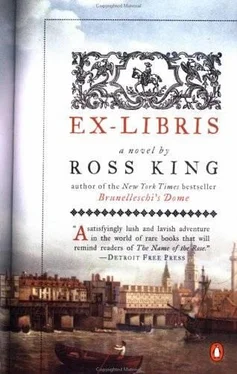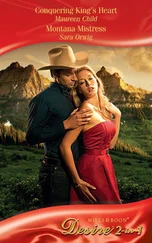She was surprised to see Sir Ambrose, of course. He had not spoken a word to her for an entire fortnight; indeed, he had not appeared to notice her at all. She, on the other hand, had watched his every move. From the quarter-lights of her chariot or the windows of inns she would watch him supervising the loading or unloading of the crates or riding alongside the Queen's carriage with the scimitar bouncing at his hip. Other times he galloped out of sight, travelling far ahead of the convoy, finding passages through the mountains or scouting for Polish troops, a band of whom he was reputed to have killed and left to the wolves. Three of his mounts were lamed by these antics and had to be destroyed, yet Sir Ambrose himself looked none the worse for wear.
'I do not disturb you, I hope?'
He had stepped nimbly into her chamber, which he, in his swollen boots and beaver hat, almost seemed to fill. Forced to duck his head under the lintel, he looked like a man entering a tent on a battlefield. When he straightened to his full height his appearance was no less martial, for the scimitar hung from one hip, the pistol from the other. But he was also bearing a lantern and, under his arm, a book. After making a bow, he paused, his bustling motions for once arrested. His head was cocked to one side like that of a painter critically examining his subject.
'You were asleep?'
'No, no,' she blurted, finding her voice. She had pushed herself upright on the bed and was holding Raleigh's Discoverie to her breast like a shield. 'No, sir. I was reading, that is all.'
He took another step forward, straw rustling under his boots and his dark gaze giving her a careful appraisal. The plume in his hat grazed the hammer-beams. 'You are unwell, Mistress Molyneux?'
'No, no,' she stammered again. She had no wish to tell anyone of her illnesses, least of all Sir Ambrose. 'I am perfectly well, thank you, sir. My habit is to read in bed,' she explained, raising the book and then feeling herself flush.
'Ah,' he was nodding his enormous hat, 'quite so. I am told you are a dedicated reader. Yes, a veritable Donna Quixote.' He smiled briefly to himself, then scratched at his beard with a forefinger. 'And in fact this charming habit of yours, Miss Molyneux, is what brings me to you.' He bent forward with a creak of boot leather and placed the volume on the table beside the door. 'The Queen wishes you to have another book for your pleasure. Along with her good wishes.' He bowed and turned to go.
'Please…' She had swung her legs over the edge of the bed. 'What news is there? Is the Queen unwell, sir?'
'No, no, the Queen is quite well. You must not believe everything you hear.' Pausing on the threshold, he winked. 'Nor should you believe all that you read.'
'I beg your pardon?'
'Sir Walter Raleigh.' His wind-burnt features had broadened into another smile as he nodded the brim of his hat at her book. 'Guiana is not the paradise that Sir Walter describes. I bid you a good day, Miss Molyneux.'
Then he was gone, disappearing down the corridor before she could ask about Vilém or indeed about anything else. But all at once she felt hopeful. He must have learned of her reading habits from Vilém. Or was it from the Queen instead? No, most probably Vilém, she decided. How else would Sir Ambrose have known of her liking for tales of chivalry? She had been careful not to tell the Queen of this passion, for the Queen detested all things Spanish.
A minute later the other ladies-in-waiting had returned to the room. There was to be a church service that night to give thanks for the Queen's recovery, followed by a banquet. For the next twenty minutes the ladies chattered happily together, dressing themselves as of old in their flowing conches, in scarlets and purples, in laces and ribbons, as if Prague or Heidelberg lay outside; as if the past few days had been no more than a night terror from which they had been mercifully roused. Only when they departed did Emilia finally open the book left by Sir Ambrose. It was another tale of chivalry-Francisco de Moraes's Prince Palmerín of England . And only when she opened the cover did she discover the note between the pages, one inscribed in a familiar hand.
***
She met Vilém that night in the cellars, to which the note had summoned her. By this time the rest of the court was in the midst of an ecstatic and deafening intercourse. The feast had begun. Musicians conscripted from a local tavern were blowing krummhorns, battering tabors and singing lustily in Polish as dancers whirled about the floor of the crumbling hall with reckless fury-a tumult of spinning farthingales and flying elbows. The castle gates must have been flung wide to admit the good people of Breslau, burghers and beggars alike, because Emilia, dodging between them, failed to recognise a single face. She had no idea, either, where the food could have come from. Platters of beef and venison, pheasants and chickens, a roasted boar, dozens of quail, even a peacock still wearing its feathers, together with bowls filled with oysters, cheeses, boiled eggs, sweetmeats, nuts, plums, persimmons, Seville oranges, ices melting under the heat of a dozen blazing torches and even more candles-all were being served up to a band of exiles who only a few days earlier had been freezing to death in the wilderness, eating weevilled bread and frozen chunks of salted goose. But Vilém was nowhere among them. After an hour she managed to slip away and descend the stairs to the vaults, where she found him in an old wine cellar, stooped over a crate of books.
She was shocked by the sight of him. He had arrived in Breslau more than a fortnight earlier, before the snows, but he appeared to be the worse for the journey. He looked thinner and more ragged than ever. His breeches and doublet hung in tattered folds about his shoulders and hips like those of a scarecrow. Perhaps he too had been ill? He had a weak constitution, she knew-several evenings in Golden Lane had been spent nursing him through one complaint or another. A booming cough suddenly bent him double.
'Vilém…?'
Their reunion was not what she expected. So busy was he checking the crates for damage, opening them one at a time, inspecting the oilskin-wrapped volumes, fussing and ducking over them before replacing dunnage, that he failed to notice her arrival. She moved quickly through the cellar towards him, weaving her way between empty wine racks and the dozens of crates. Most of the lids had been raised and tiny gilded characters glimmered in the torchlight as she passed. Later it would occur to her that the books had been crated in alphabetical order. Abulafia; Agricola; Agrippa; Artephius; Augurello. Then Bacon; Biringuccio; Böhmen; Borbonius; Bruno. The names meant little to her, as did the titles. De occulta philosophia. De arte cabalistica. Impious pursuits suggested themselves. The Mirror of Alchymy. Occulta occultum occulta. What would the Queen, a sworn enemy of popery and superstition, make of such works? FICINUM, she read on the spine of one of the thickest volumes, PIMANDER MERCURII TRISMEGISTI.
'Vilém!'
He showed no more surprise or delight when finally he saw her than when he discovered certain cherished volumes at the bottoms of the crates through which he kept searching for another twenty minutes. Indeed, over the next few days he would appear more concerned for the welfare of the books than for her. Like Otakar, he had become obsessed with the idea of the collection falling into what he called the wrong hands-being looted, burned or disappearing into the archives of Ferdinand or the cardinals in the Holy Office. Later he would tell her that he had assisted with the transport of the 'first consignment', some fifty crates of books. The second consignment was shipped from Prague by Sir Ambrose himself, for which reason Vilém would not find it odd that the Englishman was alone inside the library. Only when she described that episode-they were sitting on a pair of wine casks at this point-did he show any interest in her plight. Or, rather, he was interested in the leather-bound volume she had seen on his desk. Two times he forced her to describe the events of that evening but then, puzzled, claimed not to recognise her accounts of either the book or the horsemen. But he was especially interested in the elaborate binding. He sprang from the cask, squatted on the floor and rummaged through one of the crates for a minute, muttering to himself and grunting.
Читать дальше












